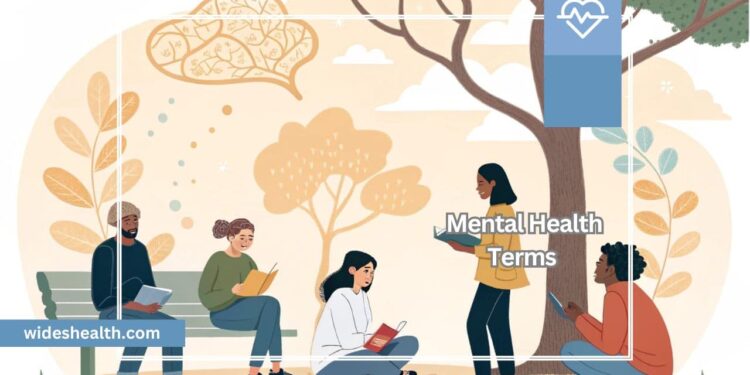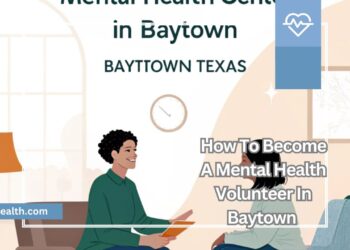Mental health is a deeply personal yet universally relevant topic. We all experience moments of joy, stress, sadness, and anxiety, but for some, these emotions become overwhelming and impact their daily lives. Despite increasing awareness, mental health remains a misunderstood subject, often due to the lack of knowledge about the terms and conditions associated with it.
I remember a time when I struggled with anxiety but didn’t have the words to express what I was feeling. It wasn’t until I read about Generalized Anxiety Disorder (GAD) that I finally understood what I was going through. That’s when I realized how powerful words can be—naming our struggles is the first step toward healing.
In this article, I’ll take you through some essential mental health terms, breaking them down into simple explanations while sharing real-life experiences to humanize the discussion. Whether you are someone struggling with mental health, supporting a loved one, or just seeking knowledge, this guide will help you navigate the language of the mind.
What Are Mental Health Terms?
When we talk about mental health, using the right words helps us understand and support each other better. Mental health terms describe different conditions, disorders, and related concepts, making communication clearer for professionals, patients, and the public. From common issues like depression and anxiety to complex disorders like schizophrenia and bipolar disorder, these terms reduce stigma and promote awareness. By learning them, we create a more compassionate world where mental health is treated with the same importance as physical health.
Why Understanding Mental Health Terms Matters?
- Reduces Stigma: Misunderstanding mental health terms often leads to stigma. By learning accurate definitions, we can foster empathy and support for those affected.
- Improves Communication: Clear terminology helps individuals express their feelings and experiences, making it easier to seek help.
- Encourages Early Intervention: Recognizing symptoms through proper terminology can lead to timely diagnosis and treatment.
- Promotes Awareness: Educating ourselves about mental health terms contributes to a more informed and compassionate society.
What is Mental Health?
Mental health refers to a person’s overall psychological, emotional, and social well-being. It affects how we think, feel, and behave in daily life. Just like physical health, mental health is not constant—it can change due to life experiences, stress levels, relationships, and self-care habits. Taking care of mental health is essential for maintaining balance and overall well-being.
Key Aspects of Mental Health:
Good mental health allows individuals to function effectively and cope with life’s challenges. Some key aspects include:
- Managing Stress: The ability to handle pressure and overcome obstacles in a healthy way.
- Building Strong Relationships: Maintaining meaningful connections with family, friends, and the community.
- Sense of Purpose: Feeling motivated, setting goals, and finding satisfaction in daily activities.
- Emotional Regulation: Understanding and controlling emotions, making rational decisions, and maintaining stability.
Factors That Influence Mental Health:
Just like physical health, mental health is shaped by various factors. Some key influences include:
- Biological Factors: Genetics, brain chemistry, and hormonal imbalances play a role in mental well-being.
- Environmental Factors: Childhood experiences, trauma, financial stress, and living conditions can impact mental health.
- Lifestyle Choices: Sleep, diet, exercise, and work-life balance contribute to emotional and psychological stability.
- Social Support: Relationships with family, friends, and the community provide emotional strength and resilience.
What does Good Mental Health look like?
Good mental health doesn’t mean a person never feels sad or stressed. Instead, it means they can:
- Manage emotions and cope with stress effectively.
- Adapt to changes and recover from difficult situations.
- Seek support when needed and maintain a positive mindset.
- Maintain healthy relationships and a balanced life.
Taking care of mental health is just as important as taking care of physical health. By adopting healthy habits, seeking help when needed, and supporting others, we can create a world where mental well-being is prioritized.
Also read: What Health Company Insurance Does Consolidated Electral Distribtors Have:
What is Mental Illness?
Mental illness refers to a diagnosed medical condition that affects a person’s thinking, emotions, or behavior in a way that disrupts daily life. These conditions can range from mild to severe and may require professional treatment.
Common Mental Illnesses:
- Depression: Persistent sadness, hopelessness, lack of motivation, and loss of interest in activities.
- Anxiety Disorders: Excessive fear, worry, and nervousness that interfere with daily life.
- Bipolar Disorder: Extreme mood swings between high-energy mania and deep depression.
- Schizophrenia: A severe disorder that affects a person’s perception, thinking, emotions, and behavior, often leading to hallucinations and delusions.
- PTSD (Post-Traumatic Stress Disorder): A condition triggered by a traumatic experience, causing flashbacks, nightmares, and severe anxiety.
Signs of Mental Illness:
- Persistent sadness or mood swings.
- Extreme fear, worry, or guilt.
- Difficulty concentrating or making decisions.
- Withdrawal from social activities or relationships.
- Changes in sleeping or eating patterns.
- Thoughts of self-harm or suicide (in severe cases).
Mental Health vs. Mental Illness: Key Differences!
| Aspect | Mental Health | Mental Illness |
| Definition | Overall emotional, psychological, and social well-being. | A medical condition affecting thoughts, emotions, and behavior. |
| Fluctuation | Can vary depending on life experiences and self-care. | Requires professional diagnosis and treatment. |
| Impact | Affects how a person copes with daily stressors. | Interferes with daily functioning and quality of life. |
| Treatment | Self-care, healthy habits, therapy (if needed). | Therapy, medication, lifestyle changes, and professional support. |
Types of Mental Health Terms:
Mental health terms can be categorized into different areas that help in understanding conditions, treatments, and support systems. Below are five key categories that highlight the various aspects of mental health.
Mental Health Disorders:
Mental health disorders affect mood, thinking, and behavior. Common disorders include depression, causing persistent sadness and hopelessness, and anxiety disorders, leading to excessive fear. Bipolar disorder involves extreme mood swings, while schizophrenia disrupts thinking and perception. Recognizing these conditions helps in seeking timely treatment.
Substance-Related Terms:
Substance abuse impacts mental well-being. Addiction is a compulsive need for substances despite harm. Alcohol use disorder leads to emotional and physical damage due to excessive drinking. Drug dependence causes withdrawal symptoms when use stops, making recovery difficult without professional support and intervention.
Developmental and Behavioral Disorders:
These conditions typically appear in childhood and affect learning and social skills. Autism spectrum disorder (ASD) involves communication difficulties and repetitive behaviors. ADHD causes hyperactivity and attention problems. Intellectual disability limits cognitive abilities, requiring specialized support for daily activities and independence.
Also read: What Doctors In Area Code 19134 Accept Keystone Health Plan – Find The Best Care Near You!
Trauma and Stress-Related Terms:
Trauma affects mental health long after the event. PTSD causes flashbacks, nightmares, and severe anxiety after a traumatic experience. Psychological First Aid (PFA) provides immediate emotional support in crises, helping individuals cope before professional intervention is available. Managing trauma is essential for long-term recovery.
Mental Health Support and Services:
Access to support improves mental health outcomes. Mental health services include therapy, counseling, and psychiatric care for various disorders. Respite care provides temporary relief for caregivers supporting individuals with mental illnesses, ensuring both receive the necessary care and time to recover emotionally and physically.
What is Anxiety?
Anxiety is the body’s way of responding to perceived threats. It can be beneficial in some situations, such as preparing for an exam or an important meeting. However, when anxiety becomes uncontrollable and occurs without a clear reason, it can disrupt daily activities, relationships, and mental health.
People with anxiety disorders often experience:
- Constant worry or fear that is difficult to control.
- Physical symptoms like a racing heart, shortness of breath, and dizziness.
- Avoidance of situations that may trigger anxiety.
There are different types of anxiety disorders, each with its symptoms and challenges.
Types of Anxiety Disorders:
Generalized Anxiety Disorder (GAD):
Generalized Anxiety Disorder (GAD) is characterized by persistent, excessive worry about everyday situations such as work, health, or relationships, even when there is no real danger. The worry is often irrational but feels uncontrollable.
Common Symptoms of GAD:
- Chronic worry and overthinking
- Restlessness and difficulty relaxing
- Muscle tension and headaches
- Difficulty concentrating
- Trouble sleeping due to racing thoughts
Personal Experience:
Before a job interview, I prepared for weeks. Even after it was over, I kept replaying the conversation in my head, fearing I had said something wrong. That’s what GAD feels like—worrying even when there’s nothing to worry about.
Panic Disorder:
Panic disorder is marked by sudden and intense panic attacks, which can feel like a heart attack. These attacks can happen without warning and create a sense of losing control.
Common Symptoms of Panic Attacks:
- Racing or pounding heart
- Shortness of breath or choking sensation
- Dizziness or feeling faint
- Intense fear or sense of doom
- Sweating and shaking
Personal Experience:
I had my first panic attack in college. My heart was pounding, my hands went numb, and I thought I was dying. At the time, I had no idea what was happening. Learning about panic attacks later helped me regain control.
Also read: How To Pass A Nicotine Test For Health Insurance – Improve Your Results!
Social Anxiety Disorder:
Social Anxiety Disorder, also known as social phobia, causes extreme fear of social interactions. Everyday situations, such as attending meetings, speaking in public, or even making small talk, can feel terrifying.
Common Symptoms of Social Anxiety:
- Fear of being judged or embarrassed
- Avoiding social situations
- Difficulty speaking in front of others
- Sweating, shaking, or blushing in social settings
- Feeling extremely self-conscious
Personal Experience:
A friend of mine would cancel plans at the last minute. Later, she admitted she wasn’t avoiding people—she was afraid of saying something embarrassing. Social anxiety isn’t about disliking people; it’s about fearing judgment.
What is Depression?
Depression is a serious medical condition that affects mood, energy levels, sleep, appetite, and overall well-being. It goes beyond temporary sadness and can impact daily life, relationships, and work performance. Depression may arise due to genetic, biological, environmental, or psychological factors. It is more than just feeling low—it can last for weeks, months, or even years and often requires professional treatment and support.
Common Symptoms of Depression:
Depression affects people differently, but it generally causes persistent emotional, physical, and behavioral symptoms that interfere with daily life. It is not just sadness—it is a medical condition that impacts thoughts, feelings, and actions. Below are some of the most common symptoms:
Persistent Sadness or Emptiness:
People with depression often experience a deep, unshakable sadness that lasts for weeks or months. They may feel hopeless, empty, or emotionally numb, even if there is no specific reason for their feelings.
Loss of Interest in Activities:
Things that once brought joy—hobbies, socializing, work, or even basic daily tasks—may no longer seem enjoyable. Depression can take away motivation, making it difficult to engage in activities that once felt meaningful.
Changes in Sleep and Appetite:
Depression can cause insomnia (difficulty sleeping) or hypersomnia (excessive sleeping). Some people experience loss of appetite, while others overeat as a way to cope, leading to weight changes.
Fatigue and Low Energy:
Even simple tasks like getting out of bed, taking a shower, or making a meal can feel exhausting. Depression drains energy, making even basic activities feel overwhelming.
Feelings of Worthlessness or Guilt:
Many people with depression struggle with low self-esteem and self-blame. They may feel they are a burden to others, experience excessive guilt over minor things, or believe they are not good enough.
Personal Experience:
I had a college roommate who battled depression. Some days, he was energetic and social. Other days, he couldn’t even get out of bed. He stopped going to class, lost interest in his favorite hobbies, and barely ate. People would say, “Just snap out of it,” but depression doesn’t work that way. It’s not a choice—it’s an illness that requires understanding and support.
Depression is treatable, and seeking professional help, therapy, or medication can make a significant difference. If you or someone you know is struggling, remember—you are not alone, and help is available.
How to Use Mental Health Terms Responsibly?
- Use Person-First Language: Say “a person with depression” instead of “a depressed person” to emphasize the individual beyond their condition.
- Avoid Casual Misuse: Refrain from using terms like “I’m so OCD” or “That’s depressing” in everyday conversation, as it minimizes real struggles.
- Speak with Empathy: Avoid dismissive phrases like “Just get over it” and instead offer support with “I’m here for you” or “You’re not alone.”
- Educate Yourself and Others: Learn about mental health conditions and correct misinformation to help create a more understanding and stigma-free environment.
- Encourage Open Conversations: Promote a safe space for discussions, support professional help, and normalize mental health talks without judgment or stigma.
The Future of Mental Health Terminology:
As research advances, our understanding of mental health continues to evolve. New terms and definitions are being introduced to better describe the complexities of mental health conditions. For example, terms like neurodiversity are gaining traction, emphasizing the value of different neurological conditions.
Additionally, mental health language is shifting toward more inclusive and non-stigmatizing terms, ensuring that individuals feel respected and understood. Culturally sensitive terminology is also being recognized, acknowledging diverse perspectives on mental well-being. As awareness grows, the future of mental health terminology will continue to adapt, educate, and empower individuals worldwide.
FAQS:
1. Why is it important to use the correct mental health terms?
Using accurate mental health terms reduces stigma, promotes understanding, and ensures individuals receive the respect and support they deserve. It also helps people communicate their experiences clearly and seek appropriate professional help when needed.
2. How is mental health terminology evolving?
As research progresses, new terms are introduced to better describe mental health conditions. Concepts like neurodiversity highlight the value of different neurological conditions, and terminology is shifting towards more inclusive and non-stigmatizing language.
3. What is the difference between mental health and mental illness?
Mental health refers to overall psychological well-being, while mental illness is a diagnosed condition that affects thoughts, emotions, and behavior. Everyone has mental health, but not everyone experiences a mental illness.
4. Why should we avoid using mental health terms casually?
Saying phrases like “I’m so OCD” or “That’s depressing” when referring to everyday situations minimizes real struggles. Using these terms inaccurately can spread misinformation and invalidate the experiences of those living with these conditions.
5. How can I educate others about mental health terminology?
You can start by sharing accurate information, correcting misconceptions politely, and encouraging open discussions. Supporting mental health awareness campaigns and promoting inclusive language helps create a more understanding and supportive society.
Conclusion:
Understanding mental health terms is essential for fostering empathy, reducing stigma, and encouraging open conversations about mental well-being. The right language helps individuals express their struggles, seek support, and access appropriate care.
As mental health awareness continues to grow, the terminology we use must evolve to be inclusive, respectful, and accurate, ensuring that no one feels misunderstood or dismissed. By educating ourselves and others, we can create a world where mental health is treated with the same importance as physical health, promoting a more compassionate and supportive society for everyone.











